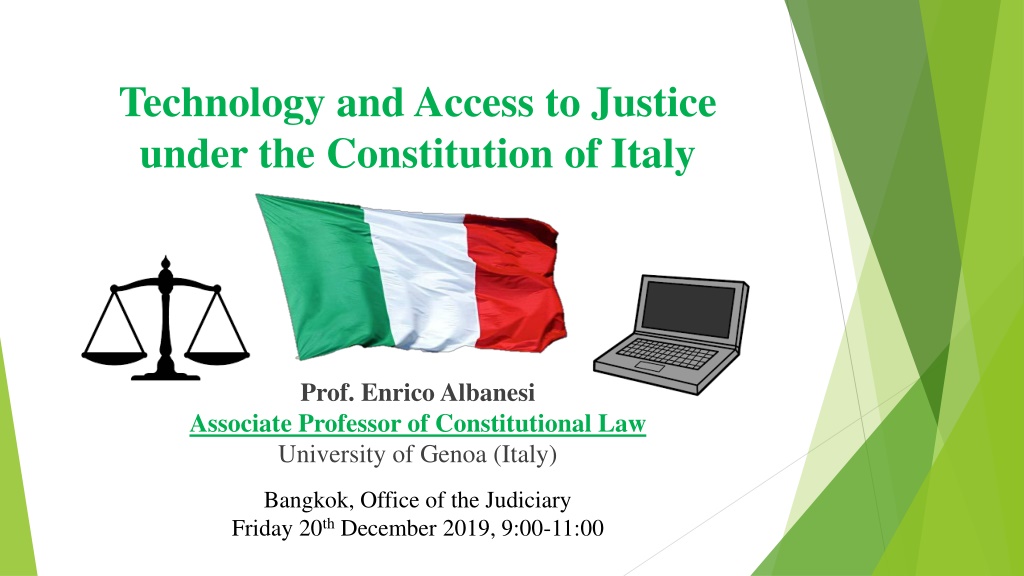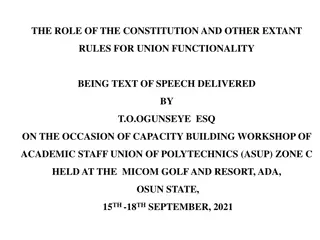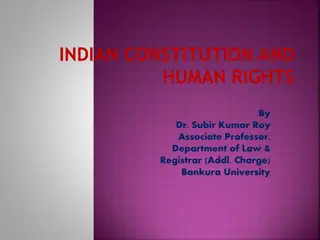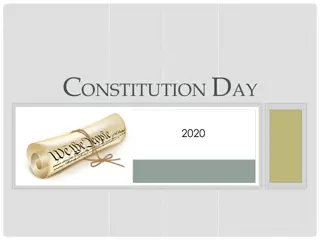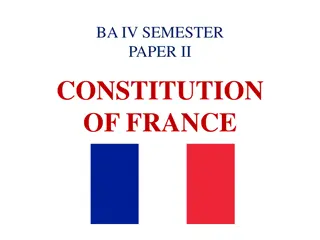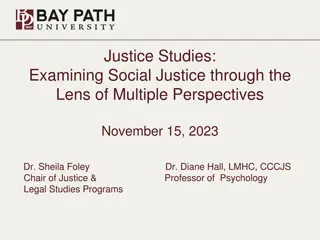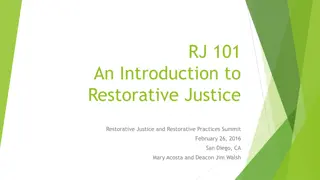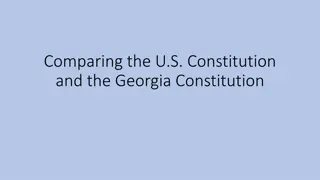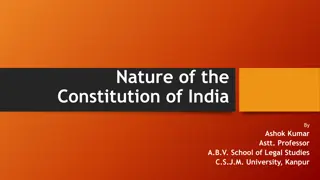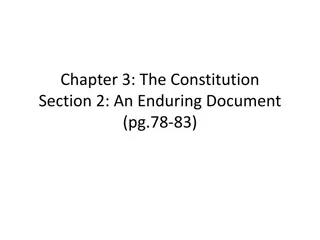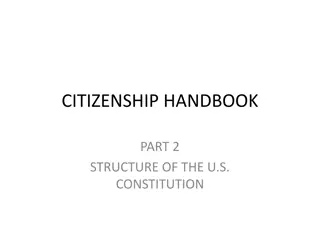Technology and Access to Justice under the Constitution of Italy
Explore the intersection of technology and access to justice in Italy, focusing on constitutional values, ICT integration, and key principles such as the right of defense and fair trial. The discussion delves into the implications of ICT on constitutional democracy, emphasizing the role of digital tools in enhancing justice systems.
Download Presentation

Please find below an Image/Link to download the presentation.
The content on the website is provided AS IS for your information and personal use only. It may not be sold, licensed, or shared on other websites without obtaining consent from the author. Download presentation by click this link. If you encounter any issues during the download, it is possible that the publisher has removed the file from their server.
E N D
Presentation Transcript
Technology and Access to Justice under the Constitution of Italy Prof. Enrico Albanesi Associate Professor of Constitutional Law University of Genoa (Italy) Bangkok, Office of the Judiciary Friday 20thDecember 2019, 9:00-11:00
An overview Part I: Access to Justice, Constitutional Values and ICT Part II: ICT and Access to Justice in Italy Part III: Constitutional Issues
Part I Introduction Access to Justice, Constitutional Values and ICT 1. Universal Declaration of Human Rights (1948) Art. 8 Everyone has the right to an effective remedy by the competent national tribunals for acts violating the fundamental rights granted him by the constitution or by law. Art. 10 Everyone is entitled in full equality to a fair and public hearing by an independent and impartial tribunal, in the determination of his rights and obligations and of any criminal charge against him.
2. Italian Constitution (1948) Art. 24, paragraph 1 Right of defence: All persons are entitled to take judicial action to protect their individual rights and legitimate interest. Art. 111, paragraph 1 Principle of fair trial: Jurisdiction is implemented through fair trial regulated by law.
3. Corollaries to the Right to Access under the Italian Constitution Art. 97, paragraph 1 Principle of efficiency in public administration: Public offices are organised according to the provisions of law, so as to ensure the efficiency and impartiality of administration. Art. 6, paragraph 1, European Convention on Human Rights Principle of judicial transparency: Judgment shall be pronounced publicly but the press and public may be excluded from all or part of the trial in the interests of morals, public order or national security in a democratic society, where the interests of juveniles or the protection of the private life of the parties so require, or to the extent strictly necessary in the opinion of the court in special circumstances where publicity would prejudice the interests of justice. Art. 111, paragraph 2 Principle of fair trial within reasonable time: The law provides for the reasonable duration of trials.
4. ICT and Constitutional Democracy According to Luigi Lombardi Vallauri (1975), there are strong connections between the use of ICT and the effectiveness of constitutional democracy, the latter as seen as those benefits for citizens within the framework of constitutional guarantees under the principle of the rule of law.
5. The Impact of ICT on Access to Justice E-government Services Principle of efficiency in public administration Online Databases of Case-law Principle of judicial transparency Online Trial Principle of fair trial within reasonable time
Part II ICT and Access to Justice in Italy 1. A Brief Overview of the Italian Judicial System Ordinary judicial bodies: civil and criminal courts (Tribunals, Courts of Appeal, Supreme Court of Cassation) Special judicial bodies: e.g. Council of State and administrative tribunals, Court of Auditors, military tribunals, tax tribunals Constitutional Court
2. E-government Services E-justice Portal provided by the Ministry of Justice: Servizi Online Uffici Giudiziari (http://pst.giustizia.it/PST/it/pst_2.wp) For citizens: e.g. to pay stamp duty (viz. tax levied on documents) e.g. to gain anonymous information on the status of the proceedings For advocates (see online trial): e.g. to pay Court duties e.g. to access and file digital legal acts and documents concerning their proceedings
3. Online Databases of Case-law Online database provided by the Supreme Court of Cassation: SentenzeWeb Corte Suprema di Cassazione (http://www.italgiure.giustizia.it/sncass/)
4. Online Trial Types of Online Trial in Italy Online Civil Trial (PCT) 30thJune 2014 Online Administrative Trial (PAT) 1stJanuary 2017 Online Tax Trial (PTT) 1stJuly 2019 Online Criminal Trial (PPT) on an experimental basis Online Constitutional Trial on an experimental basis
5. An Overview of the Online Civil Trial (PCT) Main Digital Infrastructures E-justice portal File system
Main ICT Tools for Advocates, Judges and Clerks 1. Word processor programme 2. PDF creator programme 3. Smart card/business key: strong authentication + digital signature 4. Editor software 5. Certified Electronic Mail (CEM)
Main Stages of the Online Civil Trial 1. Issuing the legal act Issuing the legal act via the word processor programme Creating a PDF Digital signature . 2. Creating an envelope Access to the File system to get the information Issuing an envelope via the editor software + digital signature ... 3. Filing the envelope Sending via certified electronic mail
Part III Constitutional Issues 1. E-government Services Risks concerning digital divide (e.g. computer skills and Internet access) Is there a constitutional right to access to the Internet? - When the online platform is the only tool for people to exercise some rights: - a) the State shall help the citizens exercise their right online; b) the State shall make alternative means available (see: Court of Justice of the European Union, C-317/08, C-318/08, C-319/08, C-320/08, Alassini, 18th March 2010, paragraphs 58 and 67)
2. Online Databeses of Case-law Principle of Transparency vs. the Right to Privacy - Letter of the Italian Data Protection Authority (2014) regarding the database SentenzeWeb: it expresses some concerns regarding the publication of personal data (names and surnames) of the relevant parties in case-law. - Solution: anonymization Free Online Databases of Case-law, the Role of Precedents in Common Law Jurisdictions and the Principle of Accountability - Can a free online database of case-law jeopardise the role of the Judiciary in its function of framing precedents in common law jurisdictions? - NO: a) in the U.K: Bailii (https://www.bailii.org/); b) it will still be on any subsequent court to frame a precedent, pointing out the ratio decidendi. Moreover, such a database will improve the accountability of the Judiciary.
3. Online Trial Legal Consequences when Digital Legal Acts are Affected by Irregularities Supreme Court of Cassation, United Chambers, Judgment No. 7665/2016: The Supreme Court of Cassation stated that digital legal acts which are affected by irregularities are not to be declared void when they had attained their legal purpose anyway. e.g. the file has been encrypted as .pdf instead of .p7m the act attended its legal purpose (being knowable) the act is not to be declared void e.g. the file sent is empty/illegible the act did not attend its legal purpose (being knowable) the act is to be declared void
Specific Provisions for Online Trial under the Constitutional Principle of Equality/Reasonableness Italian Constitutional Court, Judgment No. 75/2019: The Italian Constitutional Court founded reasonable a specific legislative provision under which online notification was regulated differently from traditional notification, in order to protect the right to respect for private life. On the other hand, it declared unconstitutional that provision in the part under which online notification was regulated differently from traditional notification, without any reasonable reason for doing that and, moreover, affecting the right of defence.
